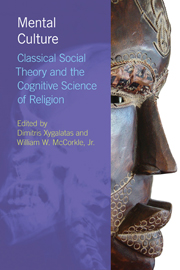Book contents
- Frontmatter
- Contents
- List of illustrations
- Contributors
- 1 Introduction: social minds, mental cultures – weaving together cognition and culture in the study of religion
- 2 Explanatory pluralism and the cognitive science of religion: why scholars in religious studies should stop worrying about reductionism
- 3 Early cognitive theorists of religion: Robin Horton and his predecessors
- 4 The opium or the aphrodisiac of the people? Darwinizing Marx on religion
- 5 Immortality, creation and regulation: updating Durkheim's theory of the sacred
- 6 Non-ordinary powers: charisma, special affordances and the study of religion
- 7 Malinowski's magic and Skinner's superstition: reconciling explanations of magical practices
- 8 Towards an evolutionary cognitive science of mental cultures: lessons from Freud
- 9 Piaget on moral judgement: towards a reconciliation with nativist and sociocultural approaches
- 10 Building on William James: the role of learning in religious experience
- 11 Explaining religious concepts: Lévi-Strauss the brilliant and problematic ancestor
- 12 The meaningful brain: Clifford Geertz and the cognitive science of culture
- 13 Cognitive science and religious thought: the case of psychological interiority in the Analects
- 14 Conclusion: moving towards a new science of religion; or have we already arrived?
- Bibliography
- Index
8 - Towards an evolutionary cognitive science of mental cultures: lessons from Freud
- Frontmatter
- Contents
- List of illustrations
- Contributors
- 1 Introduction: social minds, mental cultures – weaving together cognition and culture in the study of religion
- 2 Explanatory pluralism and the cognitive science of religion: why scholars in religious studies should stop worrying about reductionism
- 3 Early cognitive theorists of religion: Robin Horton and his predecessors
- 4 The opium or the aphrodisiac of the people? Darwinizing Marx on religion
- 5 Immortality, creation and regulation: updating Durkheim's theory of the sacred
- 6 Non-ordinary powers: charisma, special affordances and the study of religion
- 7 Malinowski's magic and Skinner's superstition: reconciling explanations of magical practices
- 8 Towards an evolutionary cognitive science of mental cultures: lessons from Freud
- 9 Piaget on moral judgement: towards a reconciliation with nativist and sociocultural approaches
- 10 Building on William James: the role of learning in religious experience
- 11 Explaining religious concepts: Lévi-Strauss the brilliant and problematic ancestor
- 12 The meaningful brain: Clifford Geertz and the cognitive science of culture
- 13 Cognitive science and religious thought: the case of psychological interiority in the Analects
- 14 Conclusion: moving towards a new science of religion; or have we already arrived?
- Bibliography
- Index
Summary
Standard objections
Sigmund Freud was a brilliant and dangerous fraud, or so many cognitive scientists believe. The Berkeley psychologist John Kihlstrom sums up current scientific sentiment when he writes:
[S]o far as we can tell Freud was wrong in every respect … [he] has been a dead weight on 20th century psychology … [Freud] is better studied as a writer, in departments of language and literature, than as a scientist, in departments of psychology. Psychologists can get along without him.
(Kihlstrom 2000: 48)Freud is thought to be dangerous because his work, while strongly appealing at an emotional level, lacks reliable scientific evidence. Even worse, as Kihlstrom observes, Freud actively discounted, ignored and attacked, ad hominem, those who used science to fault his doctrines:
[R]ecent historical analyses show that Freud's construal of his case material was systematically distorted and biased by his theories of unconscious conflict and infantile sexuality, and that he misinterpreted and misrepresented the scientific evidence available to him. Freud's theories were not just a product of his time: they were misleading and incorrect even when he published them.
(Ibid))- Type
- Chapter
- Information
- Mental CultureClassical Social Theory and the Cognitive Science of Religion, pp. 110 - 127Publisher: Acumen PublishingPrint publication year: 2013



